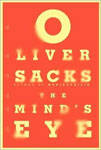Picador, 2010
Conclusion With “The Mind's Eye” Oliver Sacks reaffirms his reputation as one of the most eloquent chroniclers of the human brain.

More than anything else, Oliver Sacks is a storyteller. In “The Mind's Eye” he tells about people who have lost some aspect of their perceptive (mostly vision) or expressive (mostly speech) abilities. The book opens with a woman who suffers from severe difficulties in reading. Over the course of years her condition deteriorates, until her visual agnosia is so bad that she is effectively blind. Sacks gives a very personal and compassionate account of her story (as he does of the other cases described in the book), and focuses on the womans personality and the way she tries to cope with her condition, as much as he does on the neurological aspects. Sacks is also very eloquent; Almost unrivaled in this respect, I would say.

Nevertheless, after the first three chapters I was getting a little worried that the entire book would consist of case studies. Not that the stories aren't interesting, just not sufficiently so to fill 250 pages, especially since similar stories have been told before. Luckily, my worries were unfounded and about halfway the book switches from case studies to Sacks' personal quirks, hobbies and experiences. Apparently, he suffers from congenital prosopagnosia, which means that he has a very hard time recognizing faces. He describes how this mild deficit has led to some embarrassing situations (quite amusing) and goes a little bit into the neuroscience of face perception. Sacks is also a member of the New York stereoscopic society, a society for people who enjoy creating 3d images. In this context he provides an interesting account of stereo vision and associated deficits. In one of the last chapters, Sacks describes his own encounter with ocular cancer. Especially the quotations from Sacks' own journal from that time are quite intense.
You could criticize Sacks for relying too much on anecdotal evidence. For example, he discusses the extent to which blind people rely on visual imagery (mental visual images) based on a number of autobiographies. I am not convinced that autobiographies are a very reliable source of information, but Sacks uses these autobiographies (and other anecdotes) as food for thought and they are certainly interesting in that respect.
In summary, “The Mind's Eye” is an excellent book. Oliver Sacks' style of writing is very pleasant. An exception to the overall pleasantness of the book is the chapter that deals with Sacks' own struggle with cancer. But even here Sacks shines as a superb writer.
Get this book on amazon.com, amazon.co.uk
, bol.com or selexyz.nl.